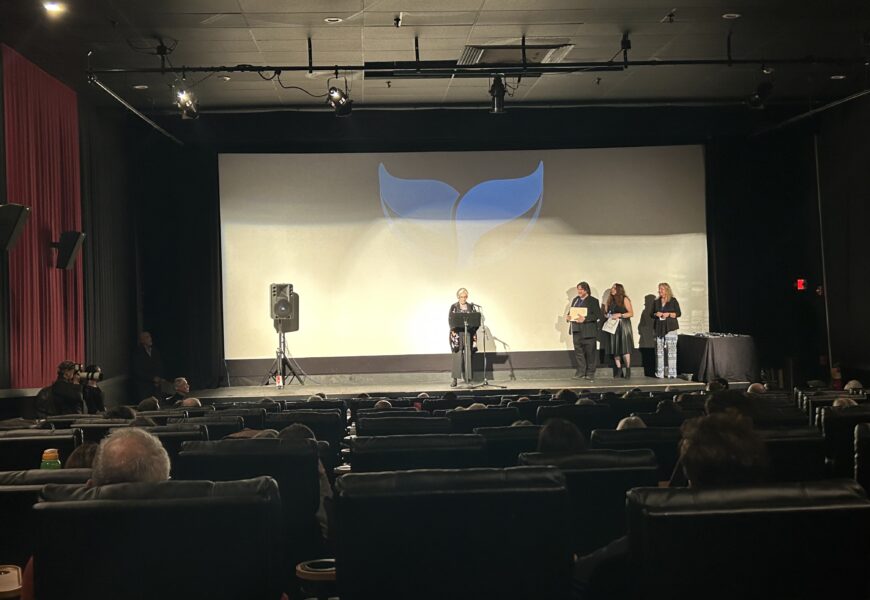Courtesy of Emma Dinkelspiel
“It’s not as pretentious as it sounds,” joked Claire Rose Kennedy as she talked about her short film, “The Thread,” which was screened on Oct. 22 at the 6th annual Mystic Film Festival. Kennedy was one of the many filmmakers from across the country who brought their work to the four-day event hosted in Mystic, CT and Westerly, RI. The festival consisted of independent films, workshops, Q&As, panel discussions, and other special events.
At a networking and wine tasting reception that preceded the viewing of the Sunday Documentary Shorts Block, we got the opportunity to chat with Kennedy. She provided us insight on the inspiration for her work which she described as “a poem with visuals” intended to parallel the patchwork quilts and collages her grandmother and mother created as their own mediums of artistic expression. Kennedy began work on the film 15 years ago after the passing of her father, but she was unable to complete it at the time. Working with clips from the original shoot alongside family videos, new material, and poetic screenwriting, Kennedy truly found “the thread” in order to create a beautifully quilted homage to the women in her family.
“It’s not what it was, but it is what it is,” said Kennedy in one of the concluding lines of the film, alluding to how the mosaic of narratives and her own personal history contributed to an unpredictable present. Kennedy’s film was one of the six featured in the Documentary Shorts Block on Sunday. Each of the films was connected by the common thread of communicating historically neglected narratives.
The viewing began with “Witch Hunt,” a historical documentary about Hollywood blacklisting during the Cold War. Conrad Bromberg, the narrator of the film and son of actor J. Edward Bromberg wanted to give a voice to his father who lost his career and passion to the cultural Cold War. “The synopsis is really long, they usually edit it,” joked Anthony Sherin, the editor and co-director who sat next to us at the film screening. Sherin won the award for Best Documentary Film Editing later that evening.
Up next was “The 29th Connecticut,” a local documentary about 11 African American soldiers from Berlin, Connecticut who fought for their rights and freedom during the Revolutionary War. The directors emphasized that while this film reflects an important historical milestone for African American rights in Connecticut, it simultaneously demonstrates the ongoing struggles of these soldiers who were underpaid for their service and faced periods of neglect and malnutrition following the war. “The 29th Connecticut” was the recipient of the Best Connecticut Film award.
One of the most experimental documentaries of the block was “Molten” directed by Matt Andrew and Hillary Federico. The film used innovative editing and visuals in order to communicate Federico’s relationship with the grief of her fathers passing. “The inspiration was love, and the outpouring of love that comes when you lose someone that manifests as grief,” Federico said at the Q&A panel following the screening. Multiple audience members made comments during the panel about how moving the film was, particularly in one scene where Federico stood in a white dress with family videos projecting onto her. The touching image stuck with viewers, and ultimately granted the film the Audience Choice Award Documentary.
“Camera and Clay” and “Make a Mark” were the final two films showcased on Sunday, both centering their narratives around the role of underrepresented people in the art community. Cormac O’Malley was inspired to make “Camera and Clay” in order to tell the story of his mother, Helen Hooker O’Malley who was an Irish sculptor and photographer. “So many artists would not have existed without her patronage and without her support,” O’Malley explained. Her works are now available in 18 different museums as well as at the Greenwich Historical Society.
“As I got older, I started to feel invisible,” Susan Mangiero, director of “Make a Mark,” shared while expressing the inspiration for her film. Her work followed Mark Sciffs artistic career following his retirement from dentistry, an inspirational story which challenges viewers to take risks in hope of finding the beauty in life. In the film, Sciff encourages audience members to ask themselves, “Do you want to open up the door and go through?”
The film festival concluded Sunday night with an awards ceremony at Mystic Luxury Cinemas. Janet Roach of Old Lyme, Connecticut was the recipient of the Lifetime Achievement Award for her dedication to film education and her impressive career in screenwriting. Roach accepted the award with a speech reflecting on her career. Her parting words paralleled the themes we witnessed throughout the day: “Doorsteps are well and good, but you need the courage to get anywhere.”










